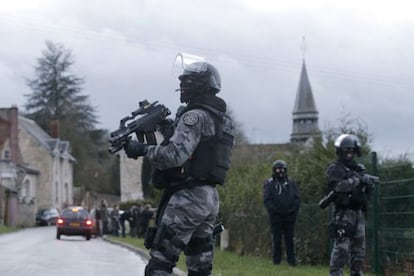Most Spaniards favor military strikes against jihadist groups, survey finds
Metroscopia poll shows 58% believe attack similar to Madrid bombings could occur again

If the hooded terrorists who last month massacred staff at the Paris offices of satirical weekly Charlie Hebdo were looking to instill fear in other countries, they may have succeeded.
Soon after the attacks at the magazine and on a Jewish kosher supermarket in the French capital, which left a total of 17 dead, Spaniards have grown more concerned about the possibility of jihadists carrying out similar strikes in their own country.
As well as this fear, Spaniards are now more inclined to support military action aimed at taking down radical Islamic groups in Syria and Iraq, according to a Metroscopia poll conducted last month.
The survey of 1,200 people was taken on January 13-14, one week after the attacks in Paris, to gauge Spaniards’ perception of the jihadist threat. The poll demonstrates how Spanish public opinion about the growing threat of jihadist terrorism has changed over the past months.
Support has grown for Spain to take part in an international coalition to defeat jihadists
Across Europe, debate has emerged over the possible introduction of controversial measures such as limits on freedom of expression, stricter border controls, and proposals to dismantle home-bred radical Islamic groups.
At least 58 percent of Spaniards believe a terrorist attack similar to the March 11, 2004 train bombings, in which 192 people were killed and 1,858 injured, could take place in their country, according to Metroscopia. Just two years ago, only 31 percent of those surveyed said they believed such an event could happen again.
When asked if they believed that an attack carried out on a specific target, such as the one on Charlie Hebdo, could occur in Spain, 64 percent answered yes. The political leanings or party affiliations of those questioned had little to do with their fear of new attacks, the survey found.
The biggest change is regarding the approaches Spaniards believe should be employed by their government to deal with jihadists. According to the poll, a majority favor military action to guarantee their security.
Four months ago, 75 percent of those surveyed said that diplomacy was the best way to stop terrorism. That poll was taken in the wake of the International Conference on Peace and Security in Iraq held in Paris last September.
During that summit, around 30 nations agreed to “employ all necessary measures to efficiently fight the Islamic State,” including providing “appropriate military aid.” At that time Spanish diplomats favored providing economic, humanitarian and military aid but ruled out sending troops to battle zones or taking part in air strikes against militants.
But four months later – with the wounds of the Paris attacks still fresh – two out of three Spaniards (62 percent) believe it is best to attack jihadist groups in Syria, Iraq or in Africa’s Sahel zone. Support for Spain to take an active part in an international coalition to defeat jihadists – similar to one organized in 2003 to oust Saddam Hussein in Iraq – has also grown, with 67 percent of those questioned in favor of such a strategy.
A large majority (64 percent) of those surveyed defended the military’s role in NATO and UN missions, as well as its duty to protect Spanish borders. Nevertheless, the percentage of support differed little from past years when 64 percent also said they supported the military’s role in 2014 and 62 percent the year before.
Tu suscripción se está usando en otro dispositivo
¿Quieres añadir otro usuario a tu suscripción?
Si continúas leyendo en este dispositivo, no se podrá leer en el otro.
FlechaTu suscripción se está usando en otro dispositivo y solo puedes acceder a EL PAÍS desde un dispositivo a la vez.
Si quieres compartir tu cuenta, cambia tu suscripción a la modalidad Premium, así podrás añadir otro usuario. Cada uno accederá con su propia cuenta de email, lo que os permitirá personalizar vuestra experiencia en EL PAÍS.
¿Tienes una suscripción de empresa? Accede aquí para contratar más cuentas.
En el caso de no saber quién está usando tu cuenta, te recomendamos cambiar tu contraseña aquí.
Si decides continuar compartiendo tu cuenta, este mensaje se mostrará en tu dispositivo y en el de la otra persona que está usando tu cuenta de forma indefinida, afectando a tu experiencia de lectura. Puedes consultar aquí los términos y condiciones de la suscripción digital.









































